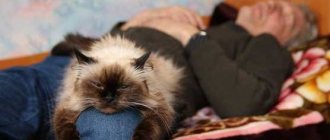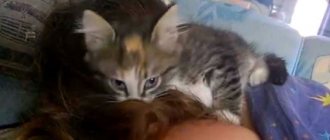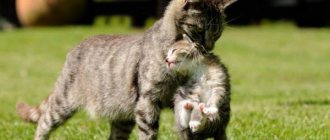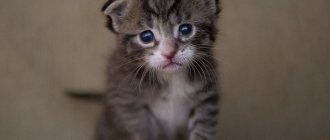7164Administration
2
Veterinarians often hear owners ask whether a cat can eat its kittens. Unfortunately, this phenomenon sometimes occurs and affects not only dead but also living cubs. This strange behavior occurs much less frequently in cats than in rabbits and pigs. However, a person who decides to start breeding cats needs to learn about their cannibalism in a timely manner in order to promptly take all the necessary measures to prevent this extremely unpleasant phenomenon.
Why do cats eat their kittens?
So, we have sorted out the question of whether cats eat their kittens. Yes, this happens. Now let's figure out whether the fact that a cat ate a kitten is a sign of her mental or physical illness.
Article continues after advertisement
First birth
For a first-time cat, the process of giving birth and the appearance of kittens is very stressful. Primiparous cats may not leave their nest for days due to confusion and anxiety and may eat their kittens due to extreme hunger or thirst. Therefore, during childbirth, the owner must be present nearby and calm the pet.
Also, when all the kittens are born, the owner should make sure that everyone is attached to the cat, since well-fed kittens are calm. The calmer the kittens are, the calmer the cat feels. If there is a kitten that squeaks a lot and refuses to cling to its mother, it is better to feed it with a syringe with a mixture for kittens and return it to the cat again.
In the case when the cat does not leave its nest, the owner should offer it food (preferably something that the cat really likes, or some kind of wet food) and water, placing bowls in the nest. Food and water should be removed as soon as the cat has eaten. If she refuses food and water, you can offer her something to eat after a short period of time. Food and water should not be left in the nest unattended: when dragging or crawling, the kittens can fall into a bowl of water and choke.
Murder by eating placenta
There are situations when a cat ate a kitten during childbirth, intending to eat only the placenta. After giving birth, the cat is exhausted and feels that there are life-giving substances in the placenta. Therefore, cats often eat the placenta after the birth of their next kitten. But sometimes cats eat their newborn kittens along with it. The thing is that they are not always able to gnaw the umbilical cord without harming the newborn. As a result, he sometimes receives injuries incompatible with life. This is one of the reasons why it is better for the owner to be present during the birth and control everything.
Eclampsia
The most common cause is postpartum eclampsia, a condition of acute calcium deficiency. This leads to excessive irritability of the cat, as a result of which it sometimes eats the kitten, bites off its head, or may hit the kitten against the wall.
Such a cat is physically sick and needs therapy, because... eclampsia ends fatally for the mother herself. But first she may develop neurological symptoms, when everything around her is infuriating, when she is ready to kill everyone, including her offspring.
Whether cats eat newborn kittens due to eclampsia immediately or some time after birth depends on when the pathology fully manifests itself.
Sick kittens
Offspring with any physiological problem can also cause a cat to kill her kittens. Among the main factors are the following:
Article continues after advertisement
- the kitten was born sick or weakened;
- the kitten has a congenital anomaly;
- the kitten and its mother have different blood Rh factors, as a result of which it is exposed to mortal danger and most likely will not survive without human help;
- The cat ate a kitten that died naturally.
In this case, the reason that the cat ate the kitten immediately or a week after giving birth was the correct natural instinct. Cats are not people: they will not nurse the sick. If they see that the kitten is not a tenant, they would rather kill it than allow it to live and suffer. This is natural selection.
Did your cat bite and eat your kitten after giving birth? Maybe she's okay. She just sees better than you who will live and grow strong and who will not.
Cat eats dead kitten
If a cat ate an already dead kitten and the kitten itself died, then you must understand that she did this because she is not a person and does not grieve for her dead offspring. The cat ate her dead kitten because it is a nutritious product that will not be unnecessary for the body that was depleted after pregnancy and childbirth. That is, for the cat it became just food.
The cat killed the kitten in a dream
Accidents happen. Cats are very sensitive creatures towards their own, and often towards other people’s offspring. However, punctures also occur when a cat strangles kittens with its body in a dream.
The cat killed someone else's kitten
If a cat ate other people's kittens, she could have done this out of extreme hunger, a sense of competition and other factors. But this rarely happens.
Cannibalism
If a cat eats its kittens, this may indicate another problem - cannibalism. Actually, this is not typical for cats. But there are genetic failures. In this case, the question of whether a cat can bite a kitten takes on new colors.
As a rule, cannibalism in cats is hereditary. That is, there is a high probability that the cat received the corresponding genes from its ancestors. Such a mother can even specially raise kittens and care for them, and then at one fine moment, when they have become plump, the cat kills the kittens for meat. Actually, initially they were only candidates for meat for her. As a rule, cannibalism is the answer to the question of why a cat bit and ate its adult one-month-old kitten, although before that everything seemed to be normal.
The essence of the problem
Cannibalism is a phenomenon in which organisms are eaten by individuals of their own species. Currently, scientists know that about 1,300 species of living beings practice cannibalism to one degree or another. This number includes insects, amphibians, reptiles, birds, mammals and even humans. Cannibalism can be considered as a manifestation of intraspecific competition, a consequence of natural selection. According to scientists' observations, the cause of intraspecific predation is most often a lack of food and water caused by population overdensification or unfavorable environmental conditions.
As for cats specifically, cannibalism is inherent in them in extremely rare, if not exceptional, cases. Common causes include, for example, accidentally eating a kitten along with the placenta during birth, biting off tails or paws during excessive grooming, eating non-viable kittens, or postpartum eclampsia. The cause may also be genetic failures or hereditary cannibalism, when a cat receives the corresponding genes from its ancestors. It is noteworthy that there are no authoritative scientific works devoted to this phenomenon in cats, but based on the available materials, let's try to figure out what to do if you witness a cat eating its kittens, what reasons there may be for this, and warn newborn kittens against this.
Can a cat eat kittens? Why do cats eat kittens?
As you already understand, the situation when a cat eats kittens is rare. Can adult male cats kill a kitten because it is alien, sick, or for some other reason? And if so, why do cats eat kittens?
Practice shows that cats rarely kill kittens and mostly through negligence (crushed, strangled, etc.). Therefore, you don’t need to worry too much about this if you have a mother with a litter and an adult cat in your house. There is no need to worry especially if the two of them live in the house and there are no other males.
However, some males, like females, inherit cannibalism. Can a cat kill a kitten because it is a cannibal? Definitely yes. Can a cat bite a kitten for this reason? Yes. If a cat ate kittens, does that mean he is a cannibal? Most likely, yes too.
Article continues after advertisement
But the claim that adult cats can kill a kitten simply because they do not like them, consider them future competitors, or are trying to kill kittens from competing cats is largely a myth. However, tragic situations do happen.
It’s a completely different story if someone else’s cat kills a kitten. There may indeed be intent here. But it does not consist in a sense of competition, as happens, for example, with lions. Most likely, if a cat killed kittens from another father, in fact, this has nothing to do with their father, but with their mother. Thus, the cat, having looked for a female for mating, provokes her to start a new heat as soon as possible, when she can be covered. He knows that while she has small children, she most likely will not flow or show interest in him. But if the cat killed the kitten, he has a chance.
Natural causes of cannibalism
It's more of a coincidence. From which, however, we are not immune. Among them, it is worth highlighting the killing of a kitten by a mother cat in her sleep. Cats are extremely kind and caring towards their own and sometimes other people’s offspring, but misfortunes do happen: cases when a cat carelessly strangles kittens with her body in a dream do occur. Accidents include murder by eating the placenta. After giving birth, the mother cat is extremely exhausted and exhausted. Feeling that there are life-giving substances in the placenta, cats often eat the placenta after the birth of the next kitten. It happens that a cat eats its newborn along with her. The fact is that it is not always possible to gnaw the umbilical cord without harming the kitten; as a result, the newborn may receive injuries incompatible with life. By the way, this is one of the reasons why owners need to be present during the birth of their pet and keep everything under control. From random reasons, let's move on to natural ones, in other words, why a cat can deliberately kill a kitten.
A cat (cat) eats kittens - what to do?
Now you know the answer to the question, do cats eat kittens - their own and others'. If such a situation occurred by chance or because the kitten had a pathology, then this is absolutely normal and nothing needs to be done. But if this is not the first time a cat has done this and there are no apparent reasons, then it is sterilized and is no longer used to produce offspring. This indicates a genetic tendency towards cannibalism, which is inherited.
It is also better to castrate kittens from such a cat and not use them when producing offspring, because with a high degree of probability they can also carry the gene for cannibalism.
Rate and share!
Pathological causes
The first birth for a cat is inevitably associated with extreme stress. We have already talked about the need for the presence of the animal's owners during childbirth. This is also necessary to make sure that all newborn kittens have attached themselves to the cat. Keeping kittens well-fed ensures they are calm, and the calmer the kittens are, the less stress your kitty is exposed to. If one of the kittens squeaks a lot and refuses to cling to the mother, it is better to feed it with a syringe with a special mixture for kittens and immediately return it to the mother. Make sure that during the birth and after nothing causes trouble for the cat: equip it with a personal space with a lounger, protect it from strangers or overly curious members of your family. This will also reduce the likelihood of stress for the cat. In addition to stress, illness can be the cause of such aggressive behavior in cats. Among which, for example, is mastitis - the course of the disease is accompanied by acute pain in the mother cat, while the animal can associate and identify clinging kittens with its painful condition, and this is fraught with the fact that the animal can behave aggressively and very seriously injure newborns. A cat that has been assisted in giving birth by caesarean section can also behave extremely aggressively towards kittens. In this case, the maternal instinct may simply not be formed. The pet will perceive newborns as strangers and may behave unpredictably. If you notice a cat's aggression towards kittens, it would be better to take the babies away from her. These are not all the reasons. Let's talk in more detail about other malfunctions in the animal's body that can cause cannibalism.
Measures to prevent cannibalism
Perhaps we can say that we have found answers to questions related to cat cannibalism. We can conclude that if such a situation occurred by accident or because the kitten had a pathology from birth, then there is nothing to worry about and no measures need to be taken. But if a cat shows aggression towards its offspring not for the first time and for no apparent reason, then it is better to sterilize it and no longer use it to produce offspring. This is evidence of a genetic tendency towards cannibalism, which will almost certainly be inherited. It is also recommended to sterilize or castrate kittens from such a mother, because they will most likely carry the gene for cannibalism.
In order to prevent cannibalism, it is extremely important to prevent provoking factors during childbirth. Here are some tips to consider if your cat is getting ready to become a mother:
- Monitor your pet closely if she is in an unstable mental state, such as being irritable, aggressive, or overactive.
- Take the pregnant woman to the veterinarian regularly, take care of her comfort, and provide her with proper care.
- During pregnancy, your cat needs your extra attention. Provide her with a secluded, warm and dry place where the animal can feel completely safe.
- During birth and immediately after, there should be no strangers near the cat and kittens. But for the reasons described above, you can’t leave your pet alone either. Take care of an observation post for yourself in advance so that, if necessary, you can assist the woman in labor and save the lives of the kittens.
By following these simple recommendations and taking into account everything discussed in this article, you can almost certainly say that if you have encountered cannibalism in cats in the past, now you know enough about its causes, which means you have something to counter it. If your cat is just preparing to become a mother, you have enough knowledge to protect future babies and prevent aggression towards them from the pet.
Source











